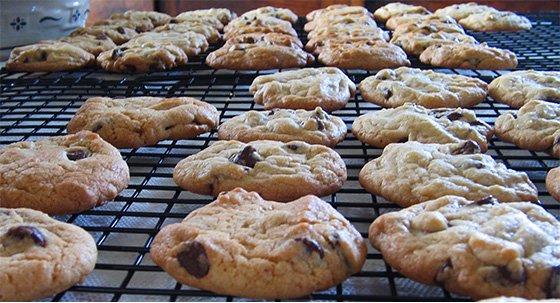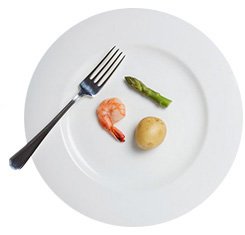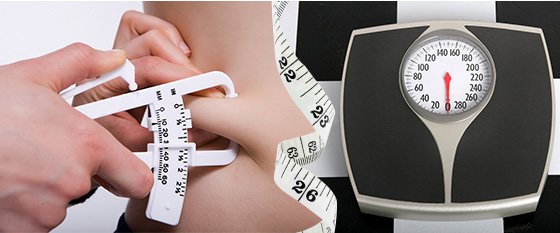You've been working your booty off for the past six months, and you're on the verge of throwing in the towel because so far, you've got nothing—nothing!—to show for your efforts. No progress. None—at least that you can see.
You're convinced you've tried everything under the sun, and you're about to resign yourself to the idea that your body just isn't destined to be in shape. You're genetically cursed to wear a spare tire around your waist forever. And so on.
There are many reasons that could explain why you're not getting where you want to go, some more complex and medical-based than others. But in the vast majority of cases that I've seen, at least one of the following five reasons plays a major part.
Take a good hard look at them—and at your lifestyle—before allowing yourself to think one more discouraging thought.
1
You eat too much
This one should be a no-brainer, yet many of us are still under the impression that just because a food is organic, natural, light, low-fat, low-carb, gluten-free, sugar-free, "no sugar added," paleo-friendly—I can go on—that we are permitted to consume it ad libitum. Then we scratch our heads and wonder what we're doing wrong when our pants still feel a little snug.
Here's a newsflash: Shopping at Whole Foods doesn't mean you will automatically become lean. Those non-GMO cookies? They're still cookies. Eating the whole bag doesn't negate the thousands of calories you just inhaled. And guess what: Chicken and rice may be one of the healthier meals out there, but you can gain fat if you eat enough of it.

Have you considered tracking your macronutrient intake? This can take the guesswork out of your eating and shed some light on how much you're actually consuming. You may be alarmed that you're ingesting 500 calories more than you thought, but that info could help answer a few questions.
2
You're not eating enough
On the flipside, you could be putting yourself through unnecessary misery by pecking at your food and clocking in at triple-digit calories per day—or an amount that feels like that much.

You drag yourself through work and try to ignore your growling stomach, trying to convince yourself that the noises are merely the sounds of fat melting away. You can't sleep at night because you feel like crap. Then when check-in time rolls around, you're dismayed to learn that despite your best efforts, you're no closer to your physique goals.
Your body needs calories! It needs fuel to function. If you're not providing yourself with an adequate amount of protein, carbohydrates, and fats, then your body will find ways to get them—no matter the cost to you or your fitness goals. Leptin, the hormone responsible for regulating body fat and weight, will plummet, and any kind of fat loss will come to a screeching halt.
If this is sounds familiar, do yourself a favor and bump up your caloric intake by a few hundred calories each day. Maybe throw an extra sweet potato into your lunch or get in some healthy fats.
Unless you're about to take the stage at Olympia Weekend, there's no good reason for you to spend your life feeling like you're at the point of starvation.
3
You're stressed out
Maybe it's work and the dozen or so projects you're juggling. Maybe it's your significant other and the constant bickering. Maybe it's the pressure you put on yourself to get to a certain body fat level before a rapidly approaching deadline.

Whatever the cause, you feel overwhelmed and tense. So the solution, you decide, is to keep tightening the reigns, put your head down, and grind it out. If you bash your head hard enough against that brick wall, you're bound to eventually bust through it, right? Not if cortisol has anything to say about it.
Cortisol is the hormone released into your body when you feel stressed. While some amount of it is necessary to stay alive, chronically high levels will negatively impact fat loss efforts—not to mention the way it contributes to a long list of seriously unpleasant health conditions.
The fitness upshot is that when you're too stressed for too long, your body will hold onto its precious fat cells for dear life, regardless of how on-point you are with your nutrition and training.
It's rough, and the answer is to take steps toward creating a less stressful lifestyle. Breathe deep as often as you can, sleep more, and stop freaking out over the little things—and the big things, if you can.
Let your body know that it doesn't have to stay in freak-out mode. You'll feel better physically and mentally and give your efforts a better chance of succeeding.
4
You're program-hopping
A fitness program is only as good as you let it be. You can have the most perfect plan in existence, but it will amount to nothing if you don't follow it consistently—or if you relentlessly cheat on it with other programs. (You might know cheating by its other name: "customizing.")
Give a workout regimen or diet a minimum of 4-6 solid weeks before you assess whether you've made any progress, and then decide from there which changes, if any, need to be made. Until then, practice trust and restraint. Quit the ADD behavior and stay focused on one thing at a time. If you ditch your plan and go sprinting toward the newest thing every time your favorite website publishes it, you'll never get anywhere.
Your plan doesn't have to be flawless. It doesn't have to be the most popular. It simply has to be executed, day in and day out, without fail.
5
You're unrealistic with your expectations
You think that just because the contestants on "The Biggest Loser" drop upward of 10 pounds in a week, you should expect the same results? Let me remind you, from my perspective as a professional trainer, that none of the methods implemented on that show are realistic or sustainable. Hours upon hours of daily exercise, shocking restrictive diets, and living in a bubble where your life is arranged solely around weight-loss—I don't think any of us would be able to keep that up for long.
Let's say it is day three of your new program and you hop on the scale. You look at the number blinking back at you and your heart drops because you're only down a pound.
Not fast enough, you think to yourself. This is obviously not working. So you decide to try something else in term of nutrition, training, or general self-punishment. But you also give yourself a break in the interim period and have yourself a merry little cheat day, because, you know, What's the point, anyway?

I don't blame you for anticipating overnight results. We've been brainwashed to believe that not only is a drastic transformation possible, but that it's the norm. You see the "before" picture, and then the "after" is right there next to it.
Who's going to speak up for sanity here? Let's lower the bar and give a cheer for slow, yet consistent progress! Maybe you made it two weeks without binging, or you got in 5 or 10 scheduled workouts without missing one. How about a victory dance for sticking to your macros and still meeting up with your friends on Friday night? A month ago you may have quarantined yourself within the confines of your home out of fear of deviating from your regimen, but now you're learning to live with it.
The only way you'll fail in your endeavors is if you give up after you make mistakes. The time is going to pass by anyway, whether you let go of your fitness goals or decide to try again. Adopt an optimistic attitude, chalk the roadblocks up to valuable experience, and keep trudging forward.
6
You focus solely on the outcome
As much as I'd love to tell you that executing the combination of x and y healthy behaviors will elicit z results, there are far too many factors at play to accurately do that. But I can tell you that sticking to those behaviors means you're behaving more healthily than if you weren't.
On some level, that has to be enough. There's a lot to be said for celebrating behavior changes. After all, habits—good and bad—are incredibly difficult to break.
In theory, you have complete control over your behavior. When something happens, it's up to you to decide how you're going to respond. Sure, you can point to plenty of out-of-control people in your life as examples to the contrary; we all can. But they just show what an incredible triumph it is to leave fatalism behind and make meaningful changes in the way we live day-by-day, decision-by-decision.
Focus on what you can control and let everything unfold as it will. Anything more is too much to ask.

